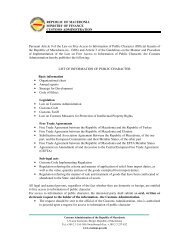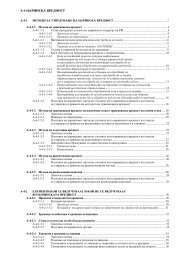REGIONAL COOPERATION AND ECONOMIC INTEGRATION
REGIONAL COOPERATION AND ECONOMIC INTEGRATION
REGIONAL COOPERATION AND ECONOMIC INTEGRATION
You also want an ePaper? Increase the reach of your titles
YUMPU automatically turns print PDFs into web optimized ePapers that Google loves.
CEFTA-2006 <strong>AND</strong> ANHANCING COMPETITIVENESS OF THE REGION - SOME SECTORAL ASPECTS<br />
even when flexibility may be preferable. There are other views as well. They include the<br />
minority view that the rule of law guarantees democracy.<br />
In 1959, an international gathering of over 185 judges, lawyers, and law professors from<br />
53 countries, meeting in New Delhi and speaking as the International Commission of<br />
Jurists, made a declaration as to the fundamental principle of the rule of law. This was the<br />
Declaration of Delhi. They declared that the rule of law implies certain rights and freedoms,<br />
that it implies an independent judiciary, and that it implies social, economic and cultural<br />
conditions conducive to human dignity. The Delhi Congress gave rise to three important<br />
elements in the concept of the Rule of Law. First, that the individual is possessed of certain<br />
rights and freedoms and that he/she is entitled to protection of these rights and freedoms<br />
by the State. Second, that there is an absolute need for an independent judiciary and bar as<br />
well as for effective system for the protection of fundamental rights and freedoms and third,<br />
that the establishment of social, economic and cultural conditions would permit men to live<br />
in dignity and to fulfill their legitimate aspirations. The Declaration of Delhi reaffirms the<br />
principles expressed in the Act of Athens adopted by the International Congress of Jurists<br />
in 1955, particularly the one that independent judiciary and legal profession are essential to<br />
the maintenance of the Rule of Law and to the proper administration of justice. It recognizes<br />
that the Rule of Law is a dynamic concept for the expansion and fulfillment of which jurists<br />
are primarily responsible and which should be employed not only to safeguard and advance<br />
the civil and political rights of the individual in a free society, but also to establish social,<br />
economic, educational and cultural conditions under which his legitimate aspirations and<br />
dignity may be realized.<br />
In the twenty-first century, the rule of law has been considered as one of the key dimensions<br />
that determines the quality and good governance of a country.<br />
2. The independent judiciary<br />
An important bond of political freedoms of citizens, legal state and rule of law is the<br />
separation and independence of the judiciary from the legislative and executive. For the<br />
rule of law and legal state technical division of powers between the legislature, executive<br />
and judiciary is not sufficient as it exists in almost all modern states. What characterizes the<br />
organization of the legal state and the rule of law is an independent judiciary. As a significant<br />
institutional and procedural bond, the rule of law and the legal state, the independence of<br />
the judiciary provides effective judicial and administrative protection and realization of<br />
freedom and rights of citizens, because “there is no liberty if the judicial power is not<br />
separate from the legislative and executive authorities” ( Monteskje, 1989, pp. 176).<br />
Independence of the judiciary is a necessary prerequisite of a democratic political<br />
environment. It is the institutional bond and the rule of law and fundamental human rights<br />
and civil liberties. Because of its importance, the independence of the judiciary has reached<br />
the level of achievements of civilization and social values. It contributes to protecting and<br />
ensuring legal security and legal equality as important legal values. All these are reasons<br />
why the European Union affirms the independence of the judiciary and the realization sets<br />
in Serbia as an important condition for joining the European Union.<br />
The United Nations has endorsed the essential importance of an independent judiciary by<br />
its adoption of the Basic Principles on the Independence of the Judiciary at its Seventh<br />
267

















